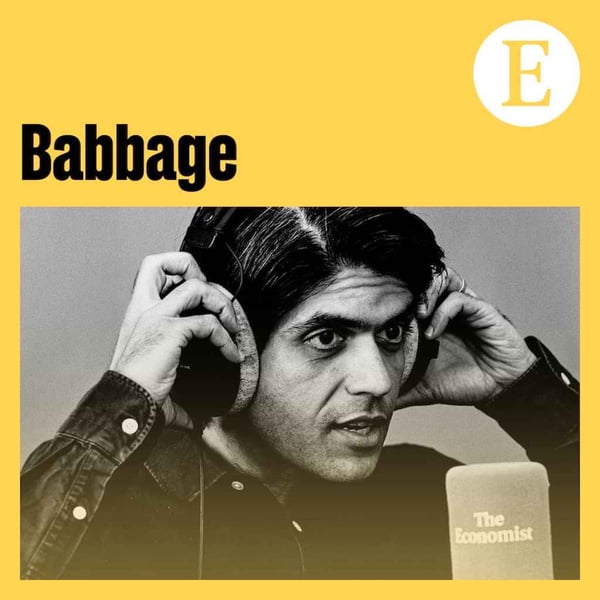Babbage: Science book club
Babbage from The Economist
The Economist
4.8 • 807 Ratings
🗓️ 20 December 2023
⏱️ 45 minutes
🧾️ Download transcript
Summary
Books are the original medium for communicating science to the masses. In a holiday special, producer Kunal Patel asks Babbage’s family of correspondents about the books that have inspired them in their careers as science journalists.
Host: Alok Jha, The Economist’s science and technology editor. Contributors: Rachel Dobbs, The Economist’s climate correspondent; Kenneth Cukier, our deputy executive editor; The Economist’s Emilie Steinmark; Geoff Carr, our senior editor for science and technology; and Abby Bertics, The Economist’s science correspondent.
Reading list: “The Periodic Table” by Primo Levi; “When We Cease to Understand the World” by Benjamín Labatut; “A Theory of Everyone” by Michael Muthukrishna; “Madame Curie” by Ève Curie; “Sociobiology” by E. O. Wilson; “The Selfish Gene” by Richard Dawkins; “Why Fish Don't Exist” by Lulu Miller; and “How Far the Light Reaches” by Sabrina Imbler.
Sign up for a free trial of Economist Podcasts+. If you’re already a subscriber to The Economist, you’ll have full access to all our shows as part of your subscription. For more information about how to access Economist Podcasts+, please visit our FAQs page or watch our video explaining how to link your account.
Transcript
Click on a timestamp to play from that location
| 0:00.0 | Hello, this episode of Babbage is available to listen for free. But if you want to listen every week, |
| 0:05.5 | you'll need to be an economist subscriber. For full details, search online for Economist Podcast Plus. |
| 0:14.0 | My dreams, my retirement, my life. My map is a range of ready-made funds managed by BlackRock, making it easier for you to |
| 0:22.9 | invest for the future you want, whatever that looks like. Our funds use ETFs and index funds to keep |
| 0:28.7 | costs low and are actively managed, meaning the funds stay within their investment risk profiles. |
| 0:34.4 | Plus, it really doesn't take much to begin investing. Just get started and let the |
| 0:38.7 | professionals do the rest. My future, my way, my map. Ready when you are. Index to Futsi |
| 0:45.7 | Russell. Capital at risk. The value of investments and the income from them can fall as well as |
| 0:50.3 | rise and are not guaranteed. Investors may not get back the amount originally invested. |
| 0:55.0 | Diversification and asset allocation may not fully protect you from market risk. |
| 1:36.7 | Just Just a short walk away from Trafalgar Square, nestled at the heart of central London, is an underground treasure trove. This is Principia Mathematica by Sir Isaac Newton. So this is from 1687. |
| 1:41.6 | It is the work that Newton is probably best known for. This is his description of the workings of the universe. |
| 1:53.5 | Books have long held a vital place in science, and the Royal Society Library holds some of the most weird and wonderful books of all. |
| 2:02.6 | In honour of the books that have shaped, spurred and spread science over the centuries, |
| 2:07.9 | our producer Canal Patel had a look at some of the Royal Society's more interesting tones. |
| 2:13.5 | My name is Keith Moore. I'm head of library at the Royal Society. |
| 2:23.3 | So here we have from 1665 Robert Hook's book, Micrographia. So this is a seriously large book with great illustrations of what one might expect to see through a microscope. |
| 2:32.3 | And the most famous of the lot is his drawing of the flea. |
| 2:37.0 | But I kind of like the head louse and various other things in here. |
| 2:46.0 | Probably the most famous natural history book of all time is this one. |
| 2:51.6 | This is Charles Darwin's On the Origin of Species. |
| 2:55.6 | So this is one that Charles Darwin himself presented to the organisation. |
... |
Please login to see the full transcript.
Disclaimer: The podcast and artwork embedded on this page are from The Economist, and are the property of its owner and not affiliated with or endorsed by Tapesearch.
Generated transcripts are the property of The Economist and are distributed freely under the Fair Use doctrine. Transcripts generated by Tapesearch are not guaranteed to be accurate.
Copyright © Tapesearch 2025.

